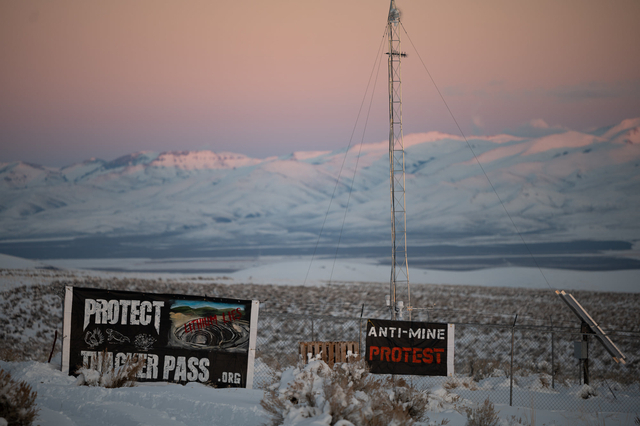
- Details
- By Darren Thompson
RENO, Nev. — A U.S. judge on Monday handed down a mixed ruling in the highly fraught Thacker Pass lithium mine case.
The ruling upheld the Bureau of Land Management’s (BLM) decision to approve the Thacker Pass lithium mine in northern Nevada but ordered the BLM to review the mining claims Lithium Americas, the company developing the mine, has in according with a 19th-century law that governs mining on public lands.
BLM, which issued a permit for the mine in 2020, had faced legal challenges from conservation organizations, a local rancher, and several tribes to stop the project.
U.S. District Court Judge Miranda M. Du wrote in her order on Monday that the court “affirms BLM's decision, rejecting arguments that the Project will cause unnecessary and undue degradation to the local sage grouse population and habitat, groundwater aquifers, and air quality in violation of Federal Land Policy…”
In oral arguments on Jan. 5, 2023, attorneys for the plaintiffs said that BLM failed to fully analyze the mine’s impacts on the environment and did not fully consult with tribes. The court disagreed and cited that BLM reasonably consulted with the Burns Paiute Tribe and Reno-Sparks Indian Tribe.
“We have expected this decision for some time,” Arlan Melendez, Chairman of the Reno-Sparks Indian Colony, said in a statement on Feb. 7. “This does not mean consultation was done correctly and it does not mean this fight is over. We will be continuing to advocate for this sacred site.”
Thacker Pass is called Peehee Mu’huh, or Rotten Moon, in Paiute because, in 1865, federal cavalry killed men, women and children and then left their bodies to rot.
Du wrote in her order on Monday, “None of the tribes who spoke to BLM’s consultant who prepared the Ethnographic Assessment identified the Thacker Pass area as either sacred or a massacre site.”
According to the court order, federal land managers sent letters to consult with the Fort McDermitt Paiute and Shoshone Tribe, the Summit Lake Paiute Tribe and the Winnemucca Indian Colony in December 2019, but BLM did not receive responses before the approval decision was released in 2020.
People of Red Mountain is an Indigenous organization of traditional knowledge keepers and members of the Fort McDermitt Paiute and Shoshone Tribe. They have been opposing the Thacker Mine project since 2021 and say that the lawsuit is a matter of protecting their culture and sites considered sacred to them.
“Federal Justice Miranda Du and her decision with the Thacker Pass lithium mine has just slithered into the malicious patterns of American law and a corporate-priority government,” People of Red Mountain said in a statement to Native News Online. “People of color are not treated with respect and equality in United Corporations of America, and capitalism is the number one threat to our climate future.
“Our hearts are heavy in hearing the decision that Judge Du did not revoke the permits for the Thacker Pass lithium mine. Indigenous Peoples’ sacred sites should not be at the expense of the climate crisis the U.S. faces.”
Last week, Native News Online reported that automaker General Motors is investing $650 million in Lithium Americas if it clears the permit process.
More Stories Like This
Trump signs law that revokes some limits on drilling in Alaska’s National Petroleum ReserveSouthern Sierra Miwuk Nation Gets 900-Acres ofLand Back
Chilkat Indian Village Tells New Palmer Mine Owners They Are “Not Welcome” in Chilkat Valley
Tribes, Coastal Group Ask Army Corps to Revoke Permit for Texas Export Terminal
Michigan Tribes Tell Supreme Court: Don’t Bail Out Enbridge
Help us defend tribal sovereignty.
At Native News Online, our mission is rooted in telling the stories that strengthen sovereignty and uplift Indigenous voices — not just at year’s end, but every single day.
Because of your generosity last year, we were able to keep our reporters on the ground in tribal communities, at national gatherings and in the halls of Congress — covering the issues that matter most to Indian Country: sovereignty, culture, education, health and economic opportunity.
That support sustained us through a tough year in 2025. Now, as we look to the year ahead, we need your help right now to ensure warrior journalism remains strong — reporting that defends tribal sovereignty, amplifies Native truth, and holds power accountable.
 The stakes couldn't be higher. Your support keeps Native voices heard, Native stories told and Native sovereignty defended.
The stakes couldn't be higher. Your support keeps Native voices heard, Native stories told and Native sovereignty defended.
Stand with Warrior Journalism today.
Levi Rickert (Potawatomi), Editor & Publisher

